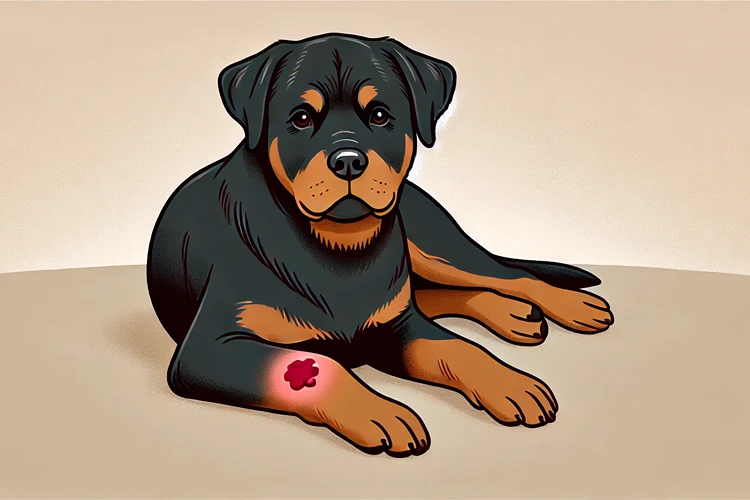Rottweilers are known for their loyalty, strength, and protective nature. But like any other breed, they aren’t immune to health issues, including allergies. If you’ve noticed your Rottweiler scratching more than usual, sneezing, or experiencing digestive problems, allergies might be the culprit. Understanding Rottweiler allergies is key to ensuring your furry friend’s comfort and health. In this article, we’ll explore the causes, symptoms, and solutions for Rottweiler allergies, helping you to recognize and manage this common issue.
What Causes Allergies in Rottweilers?
Allergies in Rottweilers can be triggered by various factors, much like in humans. These triggers can be environmental, food-related, or due to contact with certain substances. Let’s take a closer look at the most common causes of allergies in Rottweilers.
Environmental Allergens
Rottweilers can be sensitive to many environmental factors, such as pollen, dust mites, mold spores, and even grass. These allergens can be seasonal or present year-round, leading to chronic discomfort for your dog.
Paw-some Tip:
If your Rottweiler seems to suffer more during certain times of the year, it could be due to seasonal allergens like pollen. Regular baths and keeping your home clean can help reduce their exposure.
Food Allergies
Food allergies are another common issue for Rottweilers. They can develop sensitivities to specific ingredients in their diet, such as beef, chicken, dairy, or grains. Food allergies often manifest as skin issues or digestive problems.
- Common food allergens: Beef, chicken, dairy, grains
- Signs of food allergies: Itching, ear infections, gastrointestinal issues
Contact Allergens
Some Rottweilers may react to substances they come into contact with, such as certain shampoos, flea collars, or cleaning products. These contact allergens can cause localized reactions, such as rashes or irritation in specific areas.
Recognizing the Symptoms of Rottweiler Allergies
Identifying allergies in Rottweilers can be challenging, as symptoms often overlap with other health conditions. However, there are some common signs you can look out for.
Skin Irritation and Itching
One of the most noticeable symptoms of allergies in Rottweilers is skin irritation. Your dog might scratch excessively, lick their paws, or develop red, inflamed skin. In some cases, you may notice hair loss or hot spots, which are areas of intense irritation.
Rottie Stats:
Approximately 10% of dogs suffer from allergies, with skin-related symptoms being the most common sign. Addressing the cause early can prevent more severe issues.
Gastrointestinal Issues
For Rottweilers with food allergies, gastrointestinal issues like vomiting, diarrhea, or chronic gas can be telling signs. These symptoms can be particularly distressing for both the dog and the owner, requiring immediate attention.
Respiratory Symptoms
Allergies can also affect your Rottweiler’s respiratory system. Sneezing, coughing, or nasal discharge may indicate an allergic reaction, especially if these symptoms coincide with exposure to potential allergens like pollen or dust.
Common Allergens for Rottweilers and Their Effects
| Allergen Type | Common Sources | Effects on Rottweilers |
|---|---|---|
| Environmental | Pollen, Dust Mites, Mold | Skin irritation, Sneezing, Runny Nose |
| Food | Beef, Chicken, Grains | Digestive Issues, Itching, Ear Infections |
| Contact | Shampoos, Cleaning Products | Rashes, Localized Skin Reactions |
How to Manage and Treat Rottweiler Allergies
Once you’ve identified that your Rottweiler is suffering from allergies, the next step is managing and treating these symptoms effectively. Here’s what you can do.
Identifying the Allergen
The first step in treating your Rottweiler’s allergies is to identify the specific allergen causing the reaction. This might involve keeping a journal of your dog’s symptoms, conducting elimination diets for food allergies, or working with a veterinarian to perform allergy testing.
Adjusting Your Rottweiler’s Diet
If food allergies are the issue, switching to a hypoallergenic diet can make a significant difference. There are many commercial dog foods available that are free from common allergens, or you might consider a home-cooked diet with guidance from your vet.
Environmental Control
Reducing your Rottweiler’s exposure to environmental allergens can help manage symptoms. Regular cleaning, using air purifiers, and minimizing your dog’s contact with known allergens like grass or dust mites can be effective strategies.
Medications and Treatments
In some cases, medications such as antihistamines, steroids, or immunotherapy might be necessary to control severe allergic reactions. Your vet can prescribe the best treatment plan based on your Rottweiler’s specific needs.
Long-Term Management of Rottweiler Allergies
Managing Rottweiler allergies is often an ongoing process. Even after identifying the allergen and starting treatment, consistent care and monitoring are crucial to keep your dog comfortable and healthy. Here are some long-term strategies you can employ to manage your Rottweiler’s allergies effectively.
Regular Veterinary Check-Ups
Regular check-ups with your veterinarian are essential in managing your Rottweiler’s allergies. These visits allow your vet to monitor your dog’s progress, adjust treatments if necessary, and catch any new allergy triggers early. Keeping an open line of communication with your vet ensures that your dog receives the best care possible.
Paw-some Tip:
Schedule regular vet visits, at least twice a year, to keep track of your Rottweiler’s allergy management plan. Early detection of new symptoms can prevent more severe reactions.
Maintaining a Consistent Diet
Once you’ve identified the foods your Rottweiler is allergic to, it’s important to stick to a consistent diet. Avoid giving your dog table scraps or treats that might contain allergens. Be sure to read ingredient labels carefully, even on products marketed as “all-natural” or “hypoallergenic.”
In some cases, introducing new proteins or food types gradually can help in preventing the development of new food allergies. However, always consult your vet before making any significant changes to your dog’s diet.
Grooming and Skin Care
Rottweilers with skin allergies benefit greatly from regular grooming. Bathing your dog with hypoallergenic shampoos can help soothe irritated skin and wash away allergens. Regular brushing also helps remove loose fur and debris that might cause irritation.
If your Rottweiler suffers from chronic skin issues, your vet might recommend medicated baths or special skin treatments. Keeping your dog’s skin and coat healthy is a key part of managing allergies.
Environmental Adjustments
To minimize your Rottweiler’s exposure to environmental allergens, consider making some adjustments to your home and outdoor environment. Simple changes like using dust mite covers on bedding, vacuuming regularly, and using air purifiers can make a big difference.
During allergy season, try to limit your dog’s outdoor activities during peak pollen times, usually early morning or late afternoon. Wiping down your dog’s fur and paws after outdoor play can also help reduce allergens brought into the house.
Alternative and Complementary Treatments
While traditional treatments are effective, some owners explore alternative or complementary therapies to manage their Rottweiler’s allergies. These treatments can work alongside conventional methods to provide additional relief. Here are some options to consider:
Omega-3 Fatty Acids
Omega-3 fatty acids, found in fish oil supplements, can help reduce inflammation and improve skin health in Rottweilers with allergies. These supplements can be a beneficial addition to your dog’s diet, particularly if they suffer from chronic skin issues.
Herbal Remedies
Some herbal remedies, like chamomile or aloe vera, have soothing properties that can help alleviate skin irritation. However, it’s important to consult your vet before introducing any herbal treatments to ensure they are safe and won’t interfere with existing medications.
Acupuncture
Acupuncture is another alternative therapy that some pet owners use to manage their dog’s allergies. This treatment involves inserting thin needles into specific points on the body to stimulate healing and reduce allergic reactions. While more research is needed, some studies suggest that acupuncture can be beneficial for dogs with chronic allergies.
When to Seek Professional Help
While many Rottweiler allergies can be managed at home, there are times when professional intervention is necessary. Here’s when you should consider seeking help from your veterinarian:
Persistent Symptoms
If your Rottweiler’s symptoms persist despite your best efforts to manage them, it’s time to consult your vet. Persistent scratching, recurrent ear infections, or ongoing gastrointestinal issues can be signs that your current treatment plan isn’t effective, and adjustments are needed.
Severe Allergic Reactions
Severe allergic reactions, such as difficulty breathing, swelling, or sudden onset of symptoms, require immediate veterinary attention. These reactions can be life-threatening and need to be addressed as soon as possible.
Behavioral Changes
If your Rottweiler shows changes in behavior, such as increased irritability, lethargy, or aggression, it could be a sign that their allergies are causing significant discomfort. Behavioral changes are often an indicator that your dog is in pain or distress and should not be ignored.
Preventing Allergies in Rottweilers
While some Rottweilers are predisposed to allergies, there are steps you can take to reduce the likelihood of your dog developing allergies. Prevention is always better than cure, so here are some tips to keep your Rottweiler allergy-free.
Early Exposure and Diet
Introducing your Rottweiler to a variety of foods and environments early in life can help build their immune system and reduce the risk of developing allergies. A balanced diet with high-quality ingredients is crucial for maintaining your dog’s overall health and can prevent the onset of food allergies.
Regular Vet Care
Regular vet visits can help catch potential allergy issues before they become severe. Your vet can provide guidance on the best diet, grooming, and environmental practices to keep your Rottweiler healthy and allergy-free.
Environmental Hygiene
Maintaining a clean living environment is essential in preventing environmental allergies. Regular cleaning, using hypoallergenic products, and reducing exposure to known allergens can make a significant difference in your Rottweiler’s health.
FAQs
Wrapping Up
Rottweiler allergies can be a challenging aspect of pet ownership, but with the right knowledge and approach, you can effectively manage your dog’s symptoms. By understanding the common causes, recognizing symptoms early, and taking proactive steps in their care, you can ensure your Rottweiler leads a healthy and happy life. Regular vet visits, consistent diet, and environmental control are key to keeping allergies in check.




